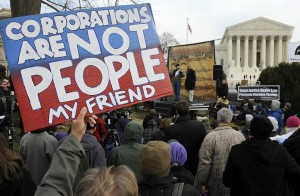Religious Freedom vs. Women’s Rights
The Hobby Lobby Case: An Accidental Battle between the First Amendment and Women’s Rights
“Stand up for religion!” “Corporations are not people!” “War on women!”
 These dime-a-dozen slogans have been dominating the news lately over what is commonly being referred to as the “Hobby Lobby” case. If you aren’t sure what that is, here is a quick run down.
These dime-a-dozen slogans have been dominating the news lately over what is commonly being referred to as the “Hobby Lobby” case. If you aren’t sure what that is, here is a quick run down.
Not long after the Affordable Care Act (Obamacare) was passed, challenges to the Act’s contraceptive mandate of the law started to file in. A contraceptive mandate, put simply, is a requirement that some type of contraceptive option be offered in an insurance plan. The first lawsuits to make their way through the legal system were the owners of Hobby Lobby and Conestoga Wood Specialties Corporation, and they are both claiming the contraceptive mandate infringes on their First Amendment right to the freedom to exercise their religion. Their matters were consolidated and are now commonly referred to as the Hobby Lobby case.
Basically, the owners of these businesses hold religious principles that conflict with the use of contraceptives. As a result of their religious beliefs, they do not want to provide their employees with insurance that would include access to contraceptive methods. If they do not prove such insurance, then they would be subject to a “tax”–per employee–for opting out of Obamacare.
The Supreme Court heard argument on this issue, and will be handing down a decision in June of 2014. While at the core of the case can be summed up in the slogans at the top of this article, the real issues delve much, much deeper.
Corporate Rights
In the Hobby Lobby case, the court is essentially forced to examine whether corporations now have religious freedoms. To some degree, this question has already been answered–after all, churches and religious organizations qualify as tax exempt, and Obamacare has already provided for contraceptive exemptions for those entities.
To be more specific, these companies are asking the court to respect the freedom of religion of the owners of these companies, under the guise that the owner’s religious beliefs are also the company’s. The families that own these corporations are essentially arguing that because this law substantially burdens their own personal religious beliefs, and because the government doesn’t have a compelling reason to create that burden, as a result they will be forced to make difficult business decisions that will be costly.
This notion–that a company can represent personal beliefs–creates an uneasy tension between individual liberty and corporate personhood. For example, as an attorney for a corporation, my client is the corporation, and not the owners, and therefore my loyalties and advocacy will almost always fall to the company, and not the owners. Likewise, while a qualifying church will not be taxed by the government, the reverend for a church must still pay taxes.
The First Amendment vs. Women’s Rights
The claims by Hobby Lobby create an even more uneasy tension between the freedom of religion and women’s rights. After all, the term “contraceptive mandate” didn’t start showing up until corporations began trying to prevent female employees from obtaining access to birth control. While corporations are fighting for religious freedoms, they are fighting against women’s rights.
At the core of the Hobby Lobby litigation, it is clear that this isn’t a First Amendment case. This isn’t even a contraception case. This is a partisan case of people trying to chip away at law that affected a powerful, very wealthy insurance lobby. Unfortunately, the First Amendment is being implicated when it really shouldn’t be.
The reality of this legal struggle simply highlights one fundamental truth: when the First Amendment and Women’s Rights cross paths, there are no real winners.


Comments